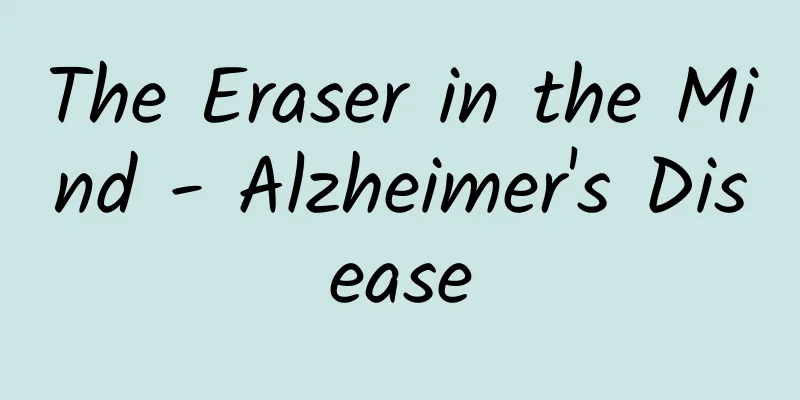The Eraser in the Mind - Alzheimer's Disease

|
Alzheimer's disease is a brain disease in the elderly. The patient's brain cells degenerate rapidly, but this is not a normal aging process. The gradual decline in brain function will lead to intellectual decline, emotional and personality changes, and ultimately seriously affect the ability to live daily life. Alzheimer's disease accounts for about 59% of senile dementia, which is commonly known as "senile dementia". Alzheimer's disease usually occurs after the age of 65. The onset is not easy to detect and develops slowly. The earliest stage often begins with gradually worsening forgetfulness. Some elderly people say, "Oh! I get older, and my memory gets worse!" This may be a precursor to Alzheimer's disease. When you find yourself, your family or your friends showing the following behaviors, you should pay special attention to them. These are the ten danger signs of Alzheimer's disease: 1. Memory gradually declines, affecting daily activities, such as adding salt twice when cooking, mixing sugar and salt, forgetting to turn off the gas after cooking, etc. 2. Having trouble handling familiar things, such as having difficulty doing daily chores, not knowing the order in which to get dressed, the steps for cooking, etc. 3. Difficulty in language expression, forgetting simple words, and making spoken or written sentences incomprehensible. 4. Becoming increasingly confused about time, place, and people; getting lost easily; not remembering what date it is, what day of the week it is, or where you live. 5. The ability to judge gradually declines, such as wearing a cotton jacket under the scorching sun and thin clothes in the cold winter. 6. The ability to understand or arrange things reasonably decreases, such as being unable to follow the train of thought of other people's conversations or being unable to pay various bills on time. 7. Often put things in inappropriate places, such as putting the iron in the washing machine. 8. Emotional instability and behavior that seems abnormal compared to before, such as rapid mood swings and becoming moody. 10. Losing the motivation to do things, wasting time all day long, and having no interest in previous hobbies. What should we do if we suspect we have Alzheimer's disease? First of all, once we suspect it, we should go to a regular hospital for examination in time. The examination department is usually the neurology department or the memory disorder clinic. When going to the clinic, it is very important to provide a detailed medical history. At the same time, the doctor will combine neuropsychological evaluation with relevant blood tests, magnetic resonance imaging and other auxiliary examinations. Once the disease is confirmed, patients and their families do not need to panic too much. They should maintain an optimistic attitude, keep in contact with the environment, let patients go out for walks and communicate with others more often, do more activities, do not isolate themselves, and continue to maintain their hobbies. This can help patients improve cognitive function and behavioral disorders, improve their daily living ability, and delay disease progression. Finally, here are a few tips to help you break down misunderstandings and gain a deeper understanding of Alzheimer’s disease: Misconception 1: Memory loss is not a disease, “it’s just like that when you get older”, “it’s just how you get older”, “there’s no need for treatment”. Alzheimer's disease will gradually worsen over time, lasting 10 to 20 years, greatly affecting the patient's ability to take care of themselves, cognition and judgment. Please remember: treatment is different from no treatment, active treatment has many benefits, early treatment is different from late treatment, and early treatment is the key. Myth 2: Alzheimer’s disease is like any other disease and can be cured by taking medicine or getting an injection at the hospital. Patients with Alzheimer's disease not only need to go to the hospital for treatment, but also require the active cooperation of patients and their families. Home care is very important for the patient's recovery. Misconception 3: After one month of treatment, there is still no effect. Is the diagnosis wrong? Are the medications still effective? The treatment of Alzheimer's disease is a long process that requires persistent medication + rehabilitation exercises to restore some functions. |
<<: Iced coffee, iced water, iced milk, iced tea... How to drink iced drinks in a healthy way?
>>: Longevity diet found! Eating this way can extend Chinese lifespan by 6 years
Recommend
How to distinguish between menopause and pregnancy
Many women have trouble differentiating between m...
How to store crabs bought today for tomorrow's consumption? Can crabs bought today be stored until tomorrow?
We all know that crab is a popular delicacy. Ther...
What to eat after morning sickness
The diet of pregnant women is related to the heal...
Pain in the left buttocks of a woman
Pain in the left buttock of women may be a sympto...
How much does breast ptosis surgery cost?
How much does breast ptosis suspension training c...
Can bilateral lobular hyperplasia of the breast be cured?
Lobular hyperplasia of the breast in women is a v...
How many weeks of pregnancy do you feel fetal movement?
Fetal movement refers to the movement of the fetu...
What kind of purple rice is good? How to make purple rice bread
Purple rice is a kind of food that we use widely ...
Does cervical nabothian cyst require surgery?
Female friends should pay attention to the mainte...
My stomach hurts every time after sex
If you experience lower abdominal pain after sexu...
What is the best time to have an abortion?
In life, it is a very happy thing for young coupl...
Attention! If you see these 7 changes on your face when you look in the mirror in the morning, it may be a sign of health problems
If you are not feeling well, your complexion will...
What to do if you need to attend a meeting after returning to work? How to prevent the new coronavirus after returning to work
These days are the peak period for major units to...
Should the sweet and sour fish be cooled before being sauced? How to prevent the fish from becoming soft after being sauced?
We all know that there are many ways to cook swee...
What to do with mixed ovarian cysts? Patients must read
There are many types of ovarian cysts, and mixed ...









